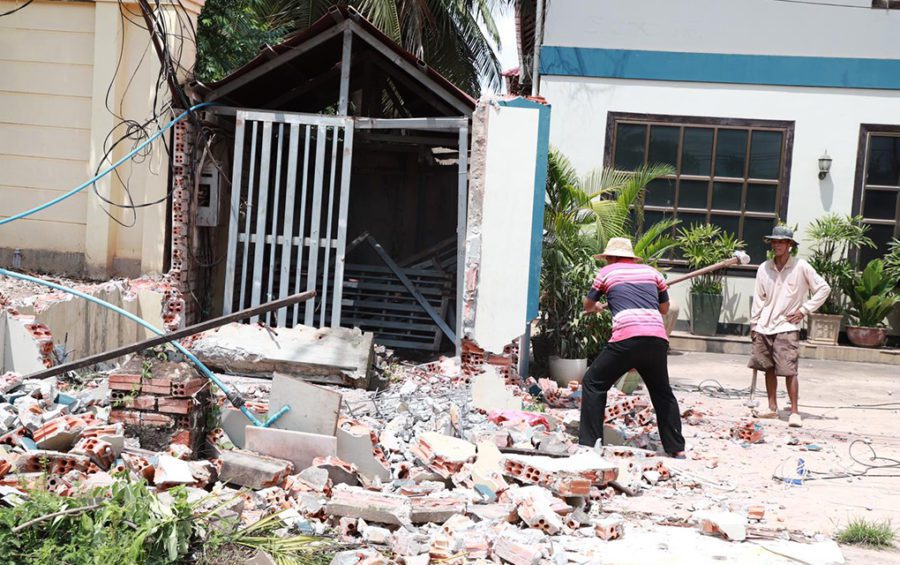Siem Reap residents say they have gone along with demolitions on their properties reluctantly and with regret to make way for road expansions, in one case cutting down to half a house that a family “spent our whole lives to build.”
The city is undergoing improvements on 38 roads — 100 km in total — requiring hundreds of residents to dismantle signs, awnings, terraces and other structures encroaching on the roadway. Some of the structures are parts of residents’ homes, built decades ago.
Sour Socheat, 38, said she had removed 10 meters from her formerly 20-meter-deep home.
“Everyday I feel regret,” Socheat said. “We spent our whole lives to build our house.”
She said the concrete building was put up in 2000 and worth about $40,000, and was the only valuable thing her parents owned.
“Now it’s gone,” Socheat said. “The Royal Government didn’t help us either. So it’s really sad and hurts.”
Koy Sophy, 28, said she had torn down her family’s money transfer and grocery shop, which was built in front of their home in the Wat Damnak area.
“It’s totally gone,” Sophy said. “It’s very regretful. But we don’t know what else to do because it’s the government’s road expansions. We can only comply.”
Siem Reap provincial spokesperson Sok Thol said 90 percent of required demolitions were now carried out. The rest was only delayed due to a lack of demolition workers, he said.
He added that there would be no compensation because the structures being removed were all illegal.
“The administrative commission measured the road sizes. According to the road sizes, even if they have a chicken-wing certificate, it is still invalid,” Thol said, referring to obsolete, old-style land titles.
A retired civil servant, who asked not to be named for fear of repercussions from local authorities, said she was demolishing two houses, and would be left with only a narrow strip of land and no buildings.
Her wooden house had already been torn down, while a concrete one was slated to be dismantled soon, she said.
She felt that she was not properly made aware that she was building illegal structures.
“It’s too unjust. What we did we didn’t do spontaneously. We asked permission from local authorities,” she said.
But she had no choice but to follow the authorities’ new orders, she said.
“If we don’t agree to do it, we could lose ownership of the [remaining] land,” she said.
Sor Vannara, rights group Licadho’s representative in Siem Reap province, said the upgrade of roads was welcome, but it was a tough time for the city’s residents due Covid-19 and a collapse in tourism.
People should receive some compensation, at least to cover the demolition work, because many are poor, he said.
“In my view, [authorities] should have some compensation because it is related to the Covid situation too,” Vannara said. “Some people are struggling. And it’s rainy season too, so it’s difficult to find shelter.”













